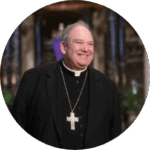Together on the Journey: A Weekly Word from Archbishop Hebda
 I hope today you are enjoying a restful Memorial Day and honoring in some way the brave women and men who gave their lives for our country. The Catholic Cemeteries welcomes hundreds of the faithful each year to Memorial Day Masses held at multiple locations throughout our archdiocese. This year I was blessed to have the Mass at Calvary Cemetery. With a number of my predecessors buried there, I tried to be on my best behavior. I’m hoping that Archbishop Ireland, a proud army chaplain at the time of the Civil War, was pleased by our celebration.
I hope today you are enjoying a restful Memorial Day and honoring in some way the brave women and men who gave their lives for our country. The Catholic Cemeteries welcomes hundreds of the faithful each year to Memorial Day Masses held at multiple locations throughout our archdiocese. This year I was blessed to have the Mass at Calvary Cemetery. With a number of my predecessors buried there, I tried to be on my best behavior. I’m hoping that Archbishop Ireland, a proud army chaplain at the time of the Civil War, was pleased by our celebration.
While it’s not a federal holiday, today is also important to me as the feast day of my favorite saint, Philip Neri. He is known as the patron saint of joy and laughter. As you may recall from a prior Weekly Word, he welcomed the opportunity to be seen as a “holy fool,” shaving off half his beard (and inspiring a wager among some of our local clergy to do the same). His example of joyful living gave vivid testimony to what the late Pope Francis popularized as the “Joy of the Gospel.”
On the 500th anniversary of St. Philip’s birth, Pope Francis held him up as a “luminous model of the Church’s ongoing mission in the world.” His mission as “chiseler of souls,” Pope Francis said, was certainly “helped by the unique attractive force of his person, distinguished by human warmth, joy, meekness, and gentleness. These particular attributes of his originated in the ardent experience of Christ and in the action of the Divine Spirit who expanded his heart.”
Joy wasn’t the only trait that drew many to St. Philip Neri. He lived a radical life for the Lord both before and after his priestly ordination. As a single young layman living amid the decadence of 16th century Rome, he manifested both a deep spirituality and an untiring desire to serve the poor, prompting him to form confraternities with lay faithful and priests dedicated to taking care of those in need, especially pilgrims coming to Rome for the Holy Year of 1550. That continued after his priestly ordination in 1551.
St. Philip’s example inspired other young men to join him, and soon he was living in a small community that shared a common life and facilitated a deeper love for Christ and neighbor. That community was formally recognized by Pope Gregory XIII as the Congregation of the Priests of the Oratory. I’m grateful that a number of our priests are striving to form an Oratory right here in St. Paul.
Preaching in the churches and streets of the Eternal City, Philip and his confreres became an important force for spiritual renewal in Rome, leading the laity of that city—and especially young adults—to true conversion at the time of the Counter Reformation. So great was his impact that even today he is known as the “Apostle of Rome.”
In the 18 years that I lived in Rome, I would always go to St. Philip’s church, the Chiesa Nuova (where else but Rome could a church built in 1600 still be called “the new Church”?) for today’s feast. I loved praying at St. Philip’s tomb and in his rooms, which were opened to the public only on May 26.
Leading up to the feast, the Oratorians in Rome would always pray a Novena to St. Philip and recite a litany that recalled the saintly traits of their founder. I was always intrigued by the first title that they attributed to him: “Vessel of the Holy Spirit.” The title recalled a life-changing mystical experience that St. Philip had while praying in the catacombs of St. Sebastian on the Vigil of Pentecost: While pleading for an outpouring of the Holy Spirit, a globe of fire entered through his mouth and settled near his heart. So intense was this experience that it forever enlarged his ribcage and generated heat that even his penitents would detect.
In recent years—and always with St. Philip in mind—I’ve delighted in the Mass that we have celebrated in our Cathedral on the Vigil of Pentecost. If you have never been to a Pentecost Vigil, I hope that you will come this year on Saturday, June 7 at 7 p.m. It’s reminiscent of the Easter Vigil with an extended Liturgy of the Word and exquisite prayers, asking for an outpouring of the same Holy Spirit who changed St. Philip’s life. It will be particularly meaningful this year as the capstone of this year’s Synod 2025 Assembly. I’m sure hoping that St. Philip will intercede for us on that day. May we all, like him, have expanded hearts for loving service as we strive to respond to the Lord’s call.
Read this message on Flocknote.
